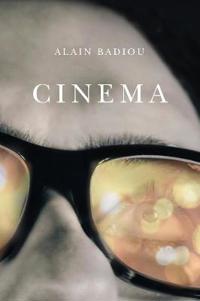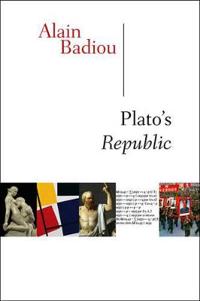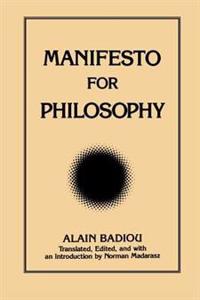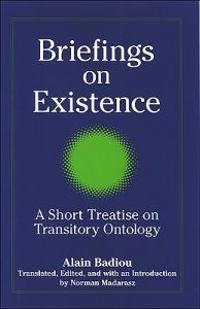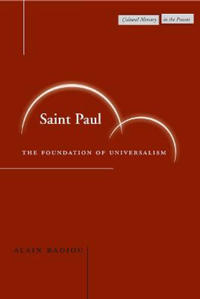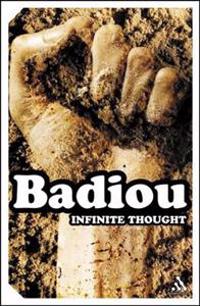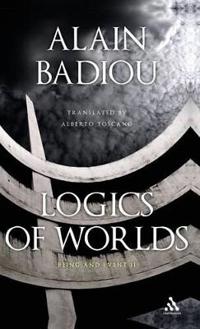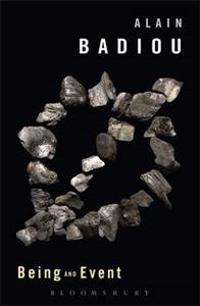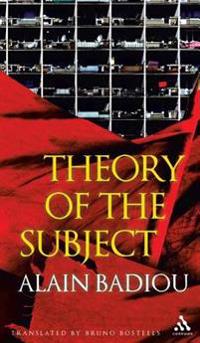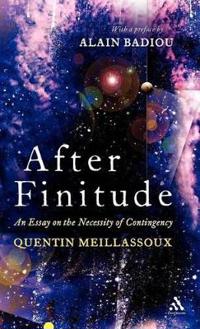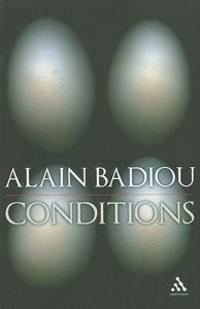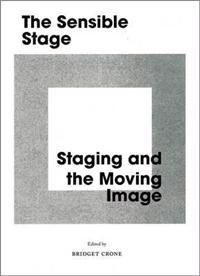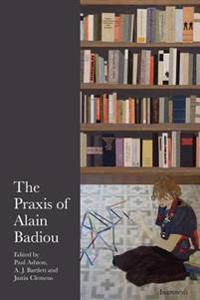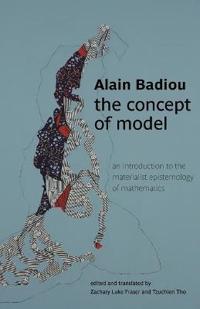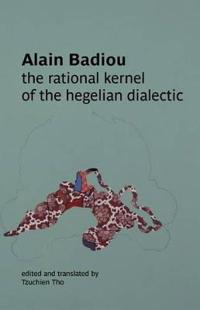Cinema (Häftad)
avAlain Badiou
ISBN: 9780745655673 - UTGIVEN: 2013-07-31For Alain Badiou, cinema is an education, an art of living, and a way of thinking. From the late 1950s to the present, he has written about his relationship with "the seventh art" in about thirty texts that amount to a comprehensive vision and interpretation of cinema.[...]
Cinema (Häftad)
avAlain Badiou
ISBN: 9780745655680 - UTGIVEN: 201307For Alain Badiou, films think, and it is the task of the philosopher to transcribe that thinking. What is the subject to which the film gives expressive form? This is the question that lies at the heart of Badiou's account of cinema. He contends that cinema is an art form that bears witness to the O[...]
Plato's Republic (Inbunden)
avAlain Badiou
ISBN: 9780745662145 - UTGIVEN: 201210Alain Badiou's translation of Plato's "Republic" is both a work of literary transformation and, implicitly, a powerful and original commentary on Plato. Badiou stands virtually alone among major, modern-day philosophers as a self-proclaimed Platonist, the champion of what he calls a "Platonism of th[...]
Controversies: Politics and Philosophy in our Time (Häftad)
avAlain Badiou, Jean-claude Milner
ISBN: 9780745682167 - UTGIVEN: 2014-07-31Controversies: Politics and Philosophy in our Time (Häftad)
avAlain Badiou, Jean-claude Milner
ISBN: 9780745682174 - UTGIVEN: 2014-07-31Confrontation: A Conversation with Aude Lancelin (Häftad)
avAlain Badiou
ISBN: 9780745685694 - UTGIVEN: 2014-09-30Alain Badiou is probably the most widely read and influential philosopher in France today. Alain Finkielkraut is also a well-known public intellectual in France Both have attracted controversy in the past and they hold strongly contrasting political views.[...]
Confrontation: A Conversation with Aude Lancelin (Häftad)
avAlain Badiou
ISBN: 9780745685700 - UTGIVEN: 2014-09-30Alain Badiou is probably the most widely read and influential philosopher in France today. Alain Finkielkraut is also a well-known public intellectual in France Both have attracted controversy in the past and they hold strongly contrasting political views.[...]
In Praise of Theatre (Inbunden)
avAlain Badiou, Nicolas Truong
ISBN: 9780745686967 - UTGIVEN: 2015-08-14In Praise of Theatre (Pocket)
avAlain Badiou, Nicolas Truong
ISBN: 9780745686974 - UTGIVEN: 2015-08-14Manifesto for Philosophy (Häftad)
avAlain Badiou
ISBN: 9780791442203 - UTGIVEN: 199906Contrary to those proclaiming the end of philosophy, Badiou aims to restore philosophical thought to the complete space of the truths that condition it.[...]
Power Resource Theory and the Welfare State (Inbunden)
avAlain Badiou
ISBN: 9780802008091 - UTGIVEN: 199806This Collection of Essays Looks at Power Resource Theory, A Ground-breaking approach to political theory that builds on the existing strengths of Marxist theorizing while addressing its weaknesses. Rather than simply asserting that all social policies in all capitalist societies exist to maintain ca[...]
Saint Paul (Häftad)
avAlain Badiou
ISBN: 9780804744713 - UTGIVEN: 200305In this bold and provocative work, French philosopher Alain Badiou proposes a startling reinterpretation of St. Paul. For Badiou, Paul is neither the venerable saint embalmed by Christian tradition, nor the venomous priest execrated by philosophers like Nietzsche: he is instead a profoundly original[...]
Infinite Thought (Häftad)
avAlain Badiou
ISBN: 9780826479297 - UTGIVEN: 200503Influenced by Plato, Lucretius, Heidegger, Lacan and Deleuze, Badiou is a critic of both the analytical and the postmodern schools of thought. His work spans the range of philosophy, from ethics, to mathematics to science, psychoanalysis, politics and art. His writing is rigorous and startling and t[...]
Logics of Worlds (Inbunden)
avAlain Badiou, Alberto Toscano
ISBN: 9780826494702 - UTGIVEN: 200904"Logics of Worlds" is the long-awaited sequel to Alain Badiou's much-heralded masterpiece, Being and Event. Tackling the questions that had been left open by Being and Event, and answering many of his critics in the process, Badiou supplements his pioneering treatment of multiple being with a daring[...]
Being and Event (Häftad)
avAlain Badiou
ISBN: 9780826495297 - UTGIVEN: 200705"Being and Event" is the centrepiece of Alain Badiou's oeuvre; it is the work that grounds his reputation as one of France's most original philosophers. Long-awaited in translation, "Being and Event" makes available to an English-speaking readership Badiou's groundbreaking work on set theory - the c[...]
Theory of the Subject (Inbunden)
avAlain Badiou
ISBN: 9780826496737 - UTGIVEN: 200905Badiou is widely considered to be France's most important and exciting contemporary thinker. Much of Badiou's earlier work (including "Being and Event") can only be fully understood with a clear grasp of "Theory of the Subject", one of his most important works."Theory of the Subject", first publishe[...]
After Finitude (Inbunden)
avQuentin Meillassoux, Ray Brassier, Alain Badiou
ISBN: 9780826496744 - UTGIVEN: 200806Quentin Meillassoux, a former student of Alain Badiou, is considered to be one of the most talented and exciting new voices in contemporary French philosophy.Quentin Meillassoux's remarkable debut makes a strikingly original contribution to contemporary French philosophy and is set to have a signifi[...]
Alain Badiou
ISBN: 9780826496935 - UTGIVEN: 2008-08This title is a concise and accessible introduction to this key theorist.Alain Badiou is undoubtedly the most exciting and influential voice in contemporary French philosophy and one of the most important theorists at work today. His impact on continental philosophy and the wider philosophy communit[...]
Conditions (Inbunden)
avAlain Badiou
ISBN: 9780826498274 - UTGIVEN: 2008-11This is the first complete English translation of the work that immediately followed Badiou's magnum opus, "Being and Event" in which Badiou provides an overview of what he sees as the four great conditions of philosophy - this book is therefore central to an understanding of Badiou's whole philosop[...]
The Sensible Stage (Häftad)
avAlain Badiou, Elie During, Ian White
ISBN: 9780955496127 - UTGIVEN: 201205The Concept of Model (Pocket)
avAlain Badiou, Zachary Luke (TRN) Fraser, Tzuchien (TRN) Tho
ISBN: 9780980305234 - UTGIVEN: 2007-12The Rational Kernel of the Hegelian Dialectic (Häftad)
avAlain Badiou
ISBN: 9780980819762 - UTGIVEN: 2011-12


